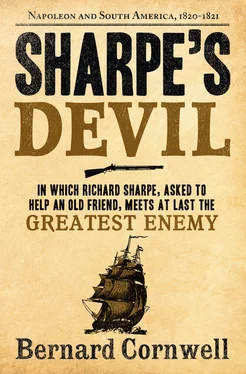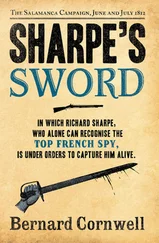‘That could be difficult.’ Blair sounded guarded. ‘Very difficult.’
‘Why?’ Sharpe bristled.
‘Because it’s a military area, and because Bautista doesn’t like visitors going there, and because it’s a port town, and the Spaniards have lost too many good harbours on this coast to let another one go, and because they think all Englishmen are spies. Besides, the citadel at Puerto Crucero is the place where the Spanish ship their gold home.’
‘Gold?’ Harper’s interest sparked.
‘There’re one or two mines left; not many and they don’t produce much, and most of what they do produce Bautista is probably thieving, but what little does go back to Madrid leaves through the wharf of Puerto Crucero’s citadel. It’s the nearest harbour to the mines, you see, which is why the dagoes are touchy about it. If you ask to visit Puerto Crucero they might think you’re spying for Cochrane. You know who Cochrane is?’
‘I know,’ Sharpe said.
‘He’s a devil, that one,’ Blair, unable to resist admiration for a fellow Briton, chuckled, ‘and they’re all scared to hell of him. You want to see a dago piss in his breeches? Just mention Cochrane. They think he’s got horns and a tail.’
Sharpe dragged the conversation back to his purpose. ‘So how do I get permission to visit Puerto Crucero?’
‘You have to get a travel permit from army headquarters.’
‘Which is where?’
‘In the Citadel, of course.’ Blair nodded at the great fort which lay on the river’s bend at the very heart of Valdivia.
‘Who do I see there?’
‘A young fellow called Captain Marquinez.’
‘Will Marquinez pay more attention to you than to me?’ Sharpe asked.
‘Oh, Christ, no! Marquinez is just an over-groomed puppy. He doesn’t make the decision. Bautista’s the one who’ll say yea or nay.’ Blair jerked a thumb towards his padlocked strongroom. ‘I hope there’s plenty of money in that box you fetched here, or else you’ll be wasting your time in Chile.’
‘My time is my own,’ Sharpe said acidly, ‘which is why I don’t want to waste it.’ He frowned at Harper who was happily devouring Blair’s sugar cakes. ‘If you can stop feeding yourself, Patrick, we might start work.’
‘Work?’ Harper sounded alarmed, but hurriedly swilled down the last of his wine and snatched a final sugar cake before following Sharpe out of Blair’s house. ‘So what work are we doing?’ the Irishman asked.
‘We’re going to dig up Don Blas’s body, of course,’ Sharpe said, ‘and arrange to have it shipped back to Spain.’ Sharpe’s confident voice seemed to rouse Valdivia’s town square from the torpor of siesta. A man who had been dozing on the church steps looked irritably towards the two tall strangers who strode so noisily towards the Citadel. A dozen Indians, their squat faces blank as carvings, sat in the shade of a mounted statue which stood in the very centre of the square. The Indians, who were shackled together by a length of heavy chain manacled to their ankles, pretended not to notice Sharpe, but could not hide their astonishment at the sight of Harper; doubtless thinking that the tall Irishman was a giant. ‘They’re admiring me, so they are!’ Harper boasted happily.
‘They’re working out how many families they could feed off your carcass. If they boiled you down and salted the flesh there probably wouldn’t be famine in this country for a century.’
‘You’re just jealous.’ Harper, seeing new sights, was a happy man. The French wars had given him a taste for travel, and that taste was being well fed by Chile. His only disappointment so far was the paucity of one-legged giants, unicorns or any other mythical beasts. ‘Look at that! Handsome, aren’t they, now?’ He nodded admiringly towards a group of women who, standing in the shade of the striped awnings which protected the shop fronts, returned Harper’s curiosity and admiration. Harper and Sharpe were new faces in a small town, and thus a cause for excited speculation. The wind swirled dust devils across the square and flapped the ornate Spanish ensign which flew over the Citadel’s gatehouse. A legless beggar, swinging along on his hands, followed Sharpe and pleaded for money. Another, who looked like a leper, made a meaningless noise and held out the stump of a wrist towards the two strangers. A Dominican monk, his white robes stained with the red dust that blew everywhere, was arguing with a carter who had evidently failed to deliver a shipment of wine.
‘We’re going to need a carter,’ Sharpe was thinking aloud as he led Harper towards the Citadel’s sentries, ‘or at least a cart. We’re also going to want two riding horses, plus saddlery, and supplies for as long as it takes to get to Puerto Crucero and back. Unless we can sail home from Puerto Crucero? Or maybe we can sail down there! That’ll be cheaper than buying a cart.’
‘What the hell do we want a cart for?’ Harper was panting at the brisk pace set by Sharpe.
‘We need a cart to carry the coffin to Puerto Crucero, unless, of course, we can go there by ship.’
‘Why the hell don’t we have a coffin made in Puerto Crucero?’ Harper asked. ‘The world’s not so short of carpenters that you can’t find a man to knock up a bloody box!’
‘Because a box won’t do the trick!’ Sharpe said. ‘The thing has to be watertight, Patrick, not to keep the rain out but to keep the decay in. We’re going to need a tinsmith, and I don’t suppose Puerto Crucero has too many of those! So we’ll have a watertight box made here before we go south.’
‘We could plop him in a vat of brandy,’ Harper suggested helpfully. ‘There’s a fellow who drinks in my place that was a gunner’s mate on the Victory at Trafalgar, and he says that after the battle they brought Nelson back in a barrel of brandy. My fellow had a look at the body when they unstowed it, and he says the Admiral was as fresh as the day he died, so he was, with flesh soft as a baby, and the only change was that all the man’s hair and nails had grown wild. He tasted the brandy too, so he did. He says it was a bit salty.’
‘I don’t want to put Don Blas in brandy,’ Sharpe said irritably. ‘He’ll be half rotted out as it is, and if we put him in a cask of bloody liquor he’ll like as not dissolve altogether, and instead of burying the poor man in Spain we’ll just be pouring him away. So we’ll put him in a tin box, solder him up tight, and take him back that way.’
‘Whatever you say,’ Harper said grimly, the tone provoked by the unfriendly faces of the sentries at the fort’s gate. The Citadel reminded Sharpe of the Spanish fortresses he had assaulted in the French wars. It had low walls over which the muzzles of the defenders’ guns showed grimly, and a wide, dry moat designed to be a killing ground for any attackers who succeeded in crossing the earthen glacis which was banked to ricochet assaulting cannonfire safely up and over the defenders’ heads. The only incongruity about Valdivia’s formidable Citadel was an ancient-looking tower that stood like a mediaeval castle turret in the very centre of the fortifications.
A sergeant accosted Sharpe and Harper on the bridge, then reluctantly allowed them into the fort itself. They walked through the entrance tunnel, across a wide parade ground, then through a second gateway into a cramped and shadowed inner courtyard. One wall of the yard was made by the ancient limewashed tower that was pockmarked by bullet holes. There were smears of dried blood near some of the bullet marks, suggesting that this cheerless place was where Valdivia’s prisoners met their firing squads.
They enquired at the inner guardroom for Captain Marquinez who, arriving five minutes later, proved to be a tall, strikingly handsome and extraordinarily fashionable young man. His uniform seemed more appropriate for the jewelled halls of Madrid than for this far, squalid colony. He wore a Hussar jacket so frogged with gold braid that it was impossible to see the cloth beneath, a white kidskin pelisse edged with black fur, and skintight sky blue cavalry breeches decorated with gold embroidery and silver side buttons. His epaulette chains, sword sling, spurs and scabbard furnishings were all of shining gold. His manners matched his uniform’s tailoring. He apologized for having kept his visitors waiting, welcomed them to Chile on behalf of Captain-General Bautista, then invited Sharpe and Harper to his quarters where, in a wide, comfortable room, his servant brought cups of steaming chocolate, small gold beakers of a clear Chilean brandy, and a plate of sugared grapes. Marquinez paused in front of a gilt-framed mirror to check that his wavy black hair was in place, then crossed to his wide-arched window to show off the view. ‘It really is a most beautiful country,’ the Captain spoke wistfully, as though he knew it was being lost.
Читать дальше












